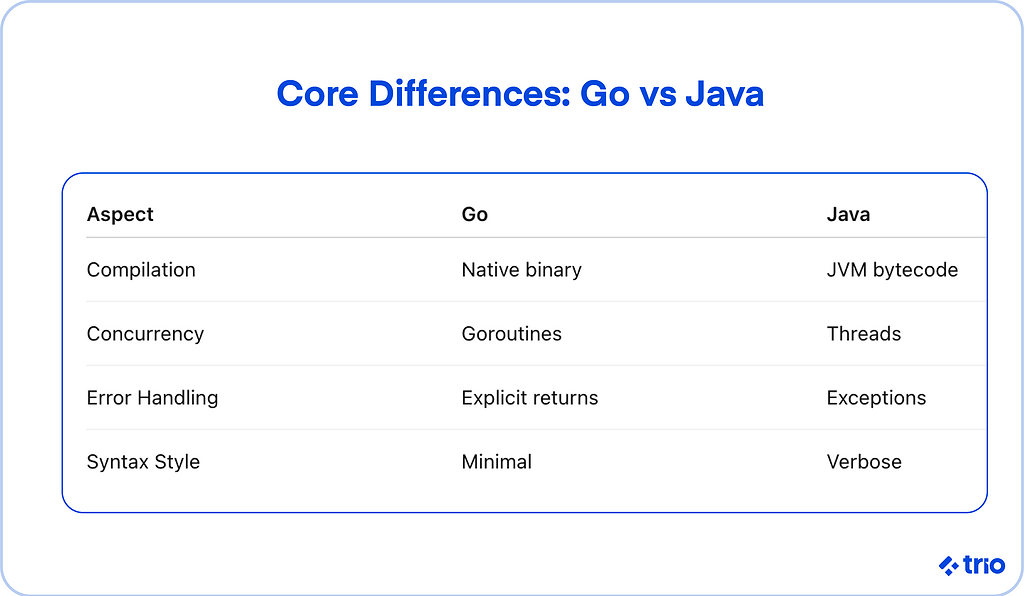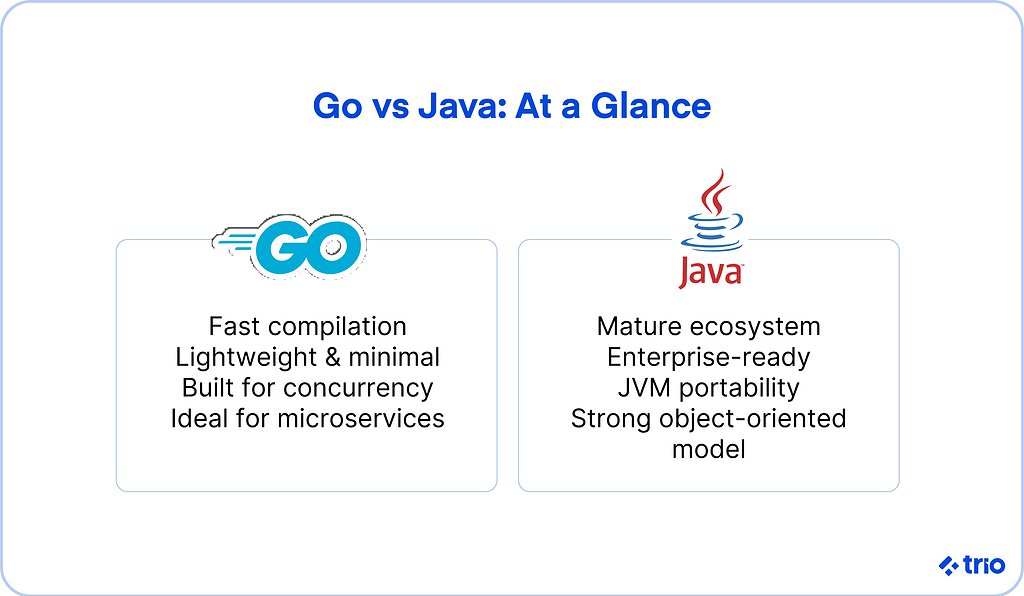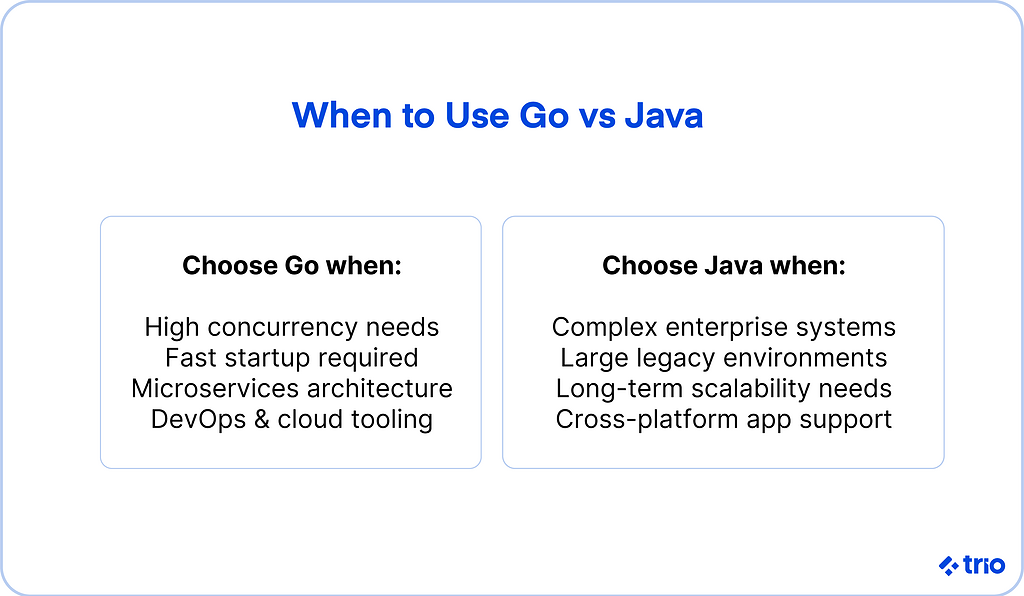Golang vs Java: Compare and contrast two notoriously fast, back-end programming languages that can take your latest software project to the next level.
Java has been around for quite some time, which gives it a long history as a powerhouse in the software industry.
Go is still fairly new, and its modern quirks often remove the headaches that come with older languages.
You may already feel torn between them. That’s normal. Both languages shine in specific scenarios, and the right choice depends on what your project actually needs.
Today’s world looks a little different from it did a few years ago. Cloud native systems are everywhere, concurrency is no longer niche, and even small teams run containerized services or event-driven workloads, powering even complex fintech platforms.
Are you ready to start your development project?
We have the developers you need to take your development project in the right direction.
Companies are proven to grow their business faster with Trio.
What Is Go?
Go, often stylized as Golang, is a statically typed, compiled, multi-purpose programming language.
Memory safety, garbage collection, structural typing, and concurrency are some of Go’s best traits.
Here’s a quick breakdown of what those terms actually mean:
- Static typing: a programming language characteristic where variable types are explicitly declared, leaving less room for runtime errors
- Compiled: refers to any programming language where source code is translated directly into machine code, leading to faster runtimes
- Memory safety: a reference to programming languages that have strong protections against bugs and security vulnerabilities
- Garbage collection: a function that encourages memory safety by automatically deleting objects from memory that can no longer be referenced
- Structural typing: a class of type systems where the language determines if a variable is equivalent to a certain variable type based on context, saving developers the time of naming the equivalence
- Concurrency: the ability of a program to perform multiple tasks at once
Now that the technical details are out of the way, you might want to know what the heart of Go really is. But first, you need to know where Go came from.
Golang was designed by Google in late 2007 as a response to older languages that could not handle massive amounts of code, networking, and multi-core processing.
Its syntax is concise and readable. It mirrors C more than anything else, but cuts out the clutter many developers dread.
A major update worth noting is the introduction of generics in Go 1.18, which gives developers more expressive power without overcomplicating the language.
Go’s toolbox reaches far into the modern cloud ecosystem. Tools like Docker, Kubernetes, Terraform, and Prometheus are written in Go. That tends to make the language feel familiar long before you’ve mastered it.
In short, Go is for people who want to build bigger and better software without unnecessary ceremony.
What Is Java?
Java is a class-based, general-purpose, object-oriented programming language.
Its philosophy centers on write once, run anywhere (WORA) and loose coupling.
Here’s a more approachable version of what that means:
- Object-oriented: a programming paradigm where reusable code can be written and manipulated using intuitive objects with accompanying attributes and methods
- Class-based: a feature of object-oriented programming (OOP) where objects in a class can inherit traits of the class (e.g., a specific car under the class car inherits a coded behavior for driving)
- WORA: an epithet denoting Java is cross-platform; the language can run on any system with a Java Virtual Machine (JVM), including smartcards, TVs, and mobile phones (given Android development)
- Loose coupling: an approach to programming where fewer dependencies are the ultimate objective, allowing different program components to work independently without jeopardizing other code
Like most languages, the perks of Java stem from the shortcomings of earlier languages. In 1995, many of the frustrations that ultimately engendered Java came from C.
Java took the best ideas and built a portable, high-performance ecosystem around them.
The language has evolved steadily. Modern Java includes things like virtual threads, which reduce the overhead of concurrency, and more predictable garbage collectors that behave well under real-world load.
Java feels familiar to many developers because it has been a cornerstone of enterprise software for decades.
Golang vs. Java: Side-by-Side Comparison
Both Go and Java are high-performing server-side languages that, for one reason or another, have some relationship to C. But which language should you choose for your next project?
Check out this side-by-side comparison to see how Java and Go compare.
| Category | Go | Java |
|---|---|---|
| Compilation | Compiles to machine code | Compiles to JVM bytecode |
| Performance | Very fast, low overhead | Steeper learning curve, but more expressive |
| Concurrency | Goroutines and channels | Threads and virtual threads |
| Memory | Simple garbage collector | Mature GC with tuning options |
| Error Handling | Explicit error returns | Exceptions |
| Ecosystem | Strong for cloud tooling and infra | Extensive enterprise ecosystem |
| Learning Curve | Smaller surface area, easier to start | Enterprise apps, Android, and large distributed systems |
| Portability | Lightweight services, DevOps, and networking | JVM runs on almost any device |
| Best Use Cases | Lightweight services, DevOps, networking | Cross-platform with recompilation |
Performance
In spite of Java’s reputation for being fast, Go surpasses Java in speed for almost every metric.
Java’s virtual machine is part of the reason. It adds a layer that gives Java incredible portability, but it also introduces overhead.
Go compiles directly to machine code. That keeps things lean and quick.
Java has improved significantly, and the just-in-time compiler may even outperform Go in long-running enterprise workloads. But for small, latency-sensitive services, Go usually appears to have the upper hand.
Winner: Go
Features
Both languages offer features developers appreciate.
Java is object-oriented and supports class inheritance, reflection, and flexible architecture patterns.
Go avoids traditional object orientation. It uses interfaces and composition, which some developers find simpler once they settle into the language.
One of Go’s biggest draws is how lightweight it feels. Meanwhile, Java’s strength is its depth. You have more room to express complex domain models, which can be useful in the right scenario.
Go’s garbage collector keeps things predictable. Java’s garbage collectors offer more control, which can be helpful at scale.
Go’s concurrency model is straightforward. Java is more established and has seen improvements with virtual threads, but Go still feels lighter.
Winner: Go. Though Java brings OOP to the table, Go’s simplicity and focus appeal to many.
Community
Java has a bigger community. It has been around longer and powers huge enterprise systems.
Go’s community is smaller but very active. Many modern infrastructure companies rely on Go, which keeps the language well supported even without the size Java enjoys.
If you’re hiring engineers, you’ll likely find more Java developers available, although Go developers tend to bring specific experience with cloud tooling.
Winner: Java
Usage
Go aims to be simple, readable, and fast to write. Its minimal syntax and small standard library push developers toward clarity.
Java is more expressive. That can feel heavier, but it also gives you more control, which matters in larger systems.
Choosing between them depends heavily on your own comfort and the complexity of the work ahead.
Winner: None

Elevate Your Team with Trio AI Talent
Empower Your Projects with Trio’s Elite Tech Teams
Application
Although both Java and Go are server-side languages, their server-side applications largely differ.
As established, the JVM makes it so that Java can be used anywhere with little to no trouble.
Java is truly a cross-platform language. Go, in contrast, markets itself as a cross-platform language, but if you dig a little deeper, you’ll find that there is some nuance to this claim.
For instance, Go compiles code into a binary file for any given platform. But the machine must create a binary file every time you compile code for a single platform.
In this way, Go does have some platform-dependency where Java is otherwise independent.
Compiling the separate binary files for each platform is no doubt time-consuming.
If high portability is your goal, Java is probably your best pick.
As an illustration of Java’s portability, consider that Java is the native language of Android. This means that if you want to build Android apps, knowing Java is step one.
To compare, Go shouldn’t be the first tool in your toolbox for developing a mobile app, but it might still belong somewhere in your tech stack if you want to optimize your back-end.
That said, the concurrency in Go makes it a great option for machine learning, but only as an alternative to Python or Java when necessary.
Winner: Java. In spite of Go’s modern features, Java is still more portable than Go in a number of circumstances.
Memory Management and Error Handling
Go uses a simple garbage collector with short pauses. Its escape analysis helps the runtime figure out where values should live without too much developer involvement.
Java’s garbage collectors offer options for tuning throughput and latency, which may matter in demanding environments.

Error handling is where preferences split:
Go example
result, err := doThing()
if err != nil {
return err
}
Java example
try {
result = doThing();
} catch (CustomException e) {
handle(e);
}
Some developers prefer Go’s verbosity because it keeps error paths visible. Others prefer Java’s exception model because it keeps most code tidy.
Ecosystem, Frameworks, and Tooling
Go works well with the modern cloud ecosystem.
You’ll see it in tools like Docker, Kubernetes, Terraform, and Prometheus. These tools often shape how developers think, making Go feel intuitive in infrastructure and platform engineering contexts.
Common Go frameworks include Gin, Echo, Fiber, and Buffalo. They lean toward simplicity and fast startup times.
Java’s ecosystem is massive. Spring Boot, Hibernate, Jakarta EE, Apache tools, and extensive build systems give teams everything they need for enterprise scale.
Java integrates well with large data systems, distributed queues, service meshes, and anything in the enterprise stack.

When To Use Go, Java, or Both
Choosing between Go and Java may feel tricky because both solve different problems.
Here’s a simple way to think about it:
Choose Go if:
• You want fast startup times
• You prefer minimal syntax
• Your system relies on heavy concurrency
• You’re building microservices or infrastructure tools
• You want predictable performance under load
Choose Java if:
• You’re working with existing Java systems
• You need enterprise-grade frameworks
• Your domain models are complex
• You expect long-term support
• You want maximum portability
Using both can make sense, too.
Some teams run Java for core business logic and Go for performance-critical endpoints.
Others modernize older Java platforms by introducing Go services gradually.

Conclusion
After running the count in your head, you may have just realized that there’s no objectively better language as far as the side-by-side comparison is concerned.
In reality, this is often the case when comparing programming languages and other technologies.
The most successful businesses find their ideal languages and frameworks, not by comparing them against each other, but by figuring out what their project needs and proceeding accordingly.
With this in mind, if Java is the best fit for your needs, Trio has qualified Java developers, only a click away.
→ Talk to us now to see about hiring Java developers!
However, if you’re looking for a faster and simpler language for your next project, Trio still has Go developers with plenty of experience meeting business needs.
→ Let Trio know what you need and hire Go developers!
FAQs
Is Go faster than Java?
Is Go faster than Java? In many short-running or concurrency-heavy workloads, yes, although Java may catch up in long-lived systems.
Is Java still relevant in 2026?
Is Java still relevant in 2026? Absolutely, since its ecosystem, tooling, and enterprise adoption remain extremely strong.
Which is better for microservices, Go or Java?
Which is better for microservices, Go or Java? Go tends to suit small, high-throughput services, while Java fits larger, more complex service architectures.
Can Go replace Java in enterprise environments?
Can Go replace Java in enterprise environments? It happens occasionally, but full replacement is rare since Java ecosystems are deeply established.
Is Go good for beginners?
Is Go good for beginners? Yes, because its syntax is small and predictable, though some beginners prefer Java’s structured OOP style.






